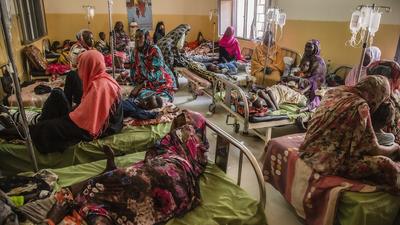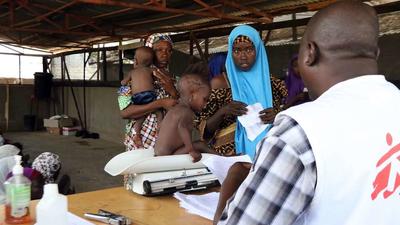An upsurge in malaria is likely to have serious consequences for people in Orientale province in Democratic Republic of Congo (DRC) unless immediate action is taken, warned Médecins Sans Frontières/Doctors Without Borders (MSF) on World Malaria Day.
Tackling recurrent outbreaks of malaria in the province demands a firm commitment from Congolese health authorities and aid organisations, said MSF.
With the rainy season about to begin, the situation is critical in remote areas of Orientale province, where malaria is one of the main causes of mortality, according to MSF emergency coordinator Dr Narcisse Wega. “Too many health centres lack the supplies necessary for coping with a new outbreak, and this is completely unacceptable,” says Dr Wega.
Malaria and measles
As well as the malaria outbreak, a measles epidemic is forecast to hit the province, with children under five most at risk.
Last year, MSF took emergency action to respond to a dramatic increase in severe malaria cases in the districts north of the city of Kisangani. In the areas of Ganga-Dingila, Buta and Aketi, almost 60,000 people received outpatient treatment and more than 3,500 people were admitted to hospital suffering from the disease.
Two mortality surveys carried out by MSF in 2012 showed extremely high mortality figures amongst children under five. In Pawa region, the mortality rate was three times the emergency threshold, with more than one in ten children dying because they did not receive care for malaria.
This is far from a unique situation in DRC, where outbreaks also occurred in the provinces of Maniema, Equateur and Katanga.
Vital supplies needed
During MSF’s emergency response in 2012, it was apparent that major deficiences in the health system had contributed to the outbreak’s severity. The same situation can be seen this year: mosquito nets are not being sent to vulnerable areas, and there are shortages of rapid diagnostic tests, drugs and the equipment for carrying out blood transfusions – vital for children suffering from anaemia caused by malaria.
These vital supplies are still not listed in the supply list drawn up by donors. The cost of health services in DRC also prevents many people from accessing the treatment they need.
MSF calls for urgent action by all those involved in the fight against malaria in DRC. To provide people with medical care, adequate treatments and rapid diagnostic testing must be available as soon as possible in the remote areas of Orientale province, while preventive measures such as the distribution of mosquito nets must start immediately, before the peak malaria season gets underway. If these actions are not taken, MSF fears that the consequences for the population could be tragic.
MSF in the DRC
MSF has been working in Democratic Republic of Congo since 1981. In 2012, MSF treated more than 500,000 people with malaria throughout the country, including large numbers of children under the age of five.
Read more about MSF’s work in the DRC





